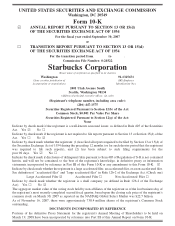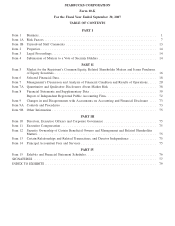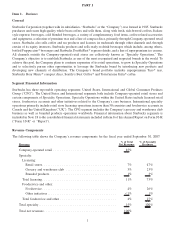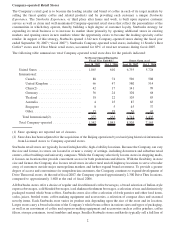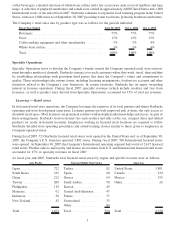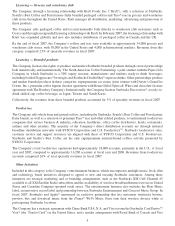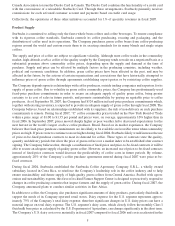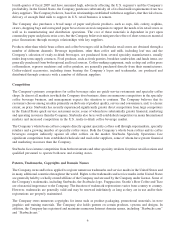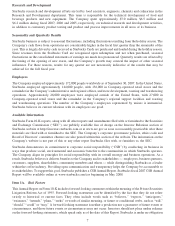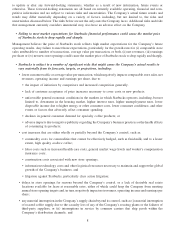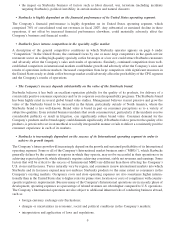Starbucks 2007 Annual Report Download - page 11
Download and view the complete annual report
Please find page 11 of the 2007 Starbucks annual report below. You can navigate through the pages in the report by either clicking on the pages listed below, or by using the keyword search tool below to find specific information within the annual report.• the impact on Starbucks business of factors such as labor discord, war, terrorism (including incidents
targeting Starbucks), political instability in certain markets and natural disasters.
•Starbucks is highly dependent on the financial performance of its United States operating segment.
The Company’s financial performance is highly dependent on its United States operating segment, which
comprised 78% of consolidated total net revenues in fiscal 2007. Any substantial or sustained decline in these
operations, if not offset by increased financial performance elsewhere, could materially adversely affect the
Company’s business and financial results.
•Starbucks faces intense competition in the specialty coffee market.
A description of the general competitive conditions in which Starbucks operates appears on page 6 under
“Competition.” In the United States, the continued focus by one or more large competitors in the quick-service
restaurant sector on selling high-quality specialty coffee beverages at a low cost could attract Starbucks customers
and adversely affect the Company’s sales and results of operations. Similarly, continued competition from well-
established competitors in international markets could hinder growth and adversely affect the Company’s sales and
results of operations in those markets. Increased competition from large competitors with significant resources in
the United States ready-to-drink coffee beverage market could adversely affect the profitability of the CPG segment
and the Company’s results of operations.
•The Company’s success depends substantially on the value of the Starbucks brand.
Starbucks believes it has built an excellent reputation globally for the quality of its products, for delivery of a
consistently positive consumer experience and for its corporate social responsibility programs. The Starbucks brand
has been highly rated in several global brand value studies. Management believes it must preserve and grow the
value of the Starbucks brand to be successful in the future, particularly outside of North America, where the
Starbucks brand is less well-known. Brand value is based in part on consumer perceptions as to a variety of
subjective qualities. Even isolated business incidents that erode consumer trust, particularly if the incidents receive
considerable publicity or result in litigation, can significantly reduce brand value. Consumer demand for the
Company’s products and its brand equity could diminish significantly if Starbucks fails to preserve the quality of its
products, is perceived to act in an unethical or socially irresponsible manner or fails to deliver a consistently positive
consumer experience in each of its markets.
•Starbucks is increasingly dependent on the success of its International operating segment in order to
achieve its growth targets.
The Company’s future growth will increasingly depend on the growth and sustained profitability of its International
operating segment. Some or all of the Company’s International market business units (“MBUs”), which Starbucks
generally defines by the countries or regions in which they operate, may not be successful in their operations or in
achieving expected growth, which ultimately requires achieving consistent, stable net revenues and earnings. Some
factors that will be critical to the success of International MBUs are different than those affecting the Company’s
U.S. stores and licensees. Tastes naturally vary by region, and consumers in new international markets into which
Starbucks and its licensees expand may not embrace Starbucks products to the same extent as consumers in the
Company’s existing markets. Occupancy costs and store operating expenses are also sometimes higher interna-
tionally than in the United States due to higher rents for prime store locations or costs of compliance with country-
specific regulatory requirements. Because many of the Company’s International operations are in an early phase of
development, operating expenses as a percentage of related revenues are often higher compared to U.S. operations.
The Company’s International operations are also subject to additional inherent risks of conducting business abroad,
such as:
• foreign currency exchange rate fluctuations;
• changes or uncertainties in economic, social and political conditions in the Company’s markets;
• interpretation and application of laws and regulations;
9

